DO A SEARCH FOR WAR PROFITEER AND AGENT FOR RED CHINA DIANNE FEINSTEIN.... JUST FOLLOW THE MONEY RIGHT INTO RICHARD BLUM'S POCKETS!
George Soros: Xi Jinping Is the ‘Most Dangerous Enemy’ of the Free World
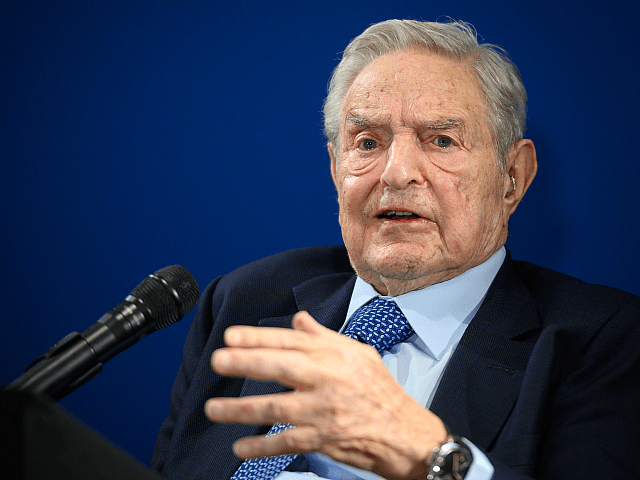
Left-wing billionaire George Soros once again warned that Chinese leader Xi Jinping is “the most dangerous enemy of open societies in the world” in an op-ed published Friday by the Wall Street Journal (WSJ).
“Xi Jinping, the ruler of China, suffers from several internal inconsistencies which greatly reduce the cohesion and effectiveness of his leadership,” Soros argued.
“There is a conflict between his beliefs and his actions and between his public declarations of wanting to make China a superpower and his behavior as a domestic ruler,” the Hungarian investor, 91, said. “These internal contradictions have revealed themselves in the context of the growing conflict between the U.S. and China.”
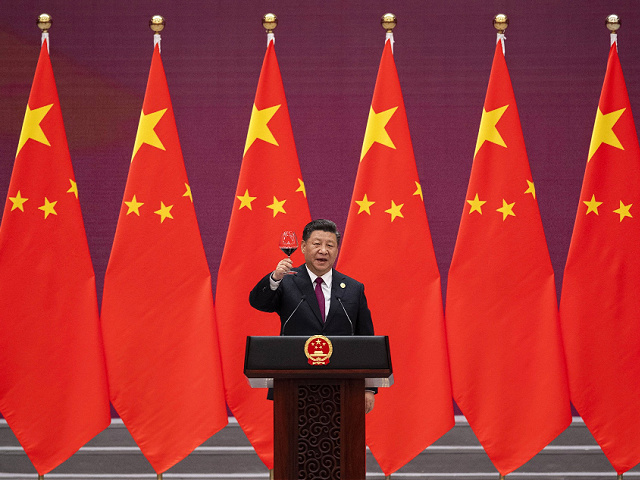
Chinese President Xi Jinping raises his glass and proposes a toast during the welcome banquet for visiting leaders attending the Belt and Road Forum at the Great Hall of the People, Friday, April 26, 2019. (Nicolas Asfouri/Pool Photo via AP)
At the “heart” of the Washington-Beijing conflict is “the reality that the two nations represent systems of governance that are diametrically opposed,” Soros continued.
“The U.S. stands for a democratic, open society in which the role of the government is to protect the freedom of the individual. Mr. Xi believes Mao Zedong invented a superior form of organization, which he is carrying on: a totalitarian closed society in which the individual is subordinated to the one-party state,” he explained.
“Relations between China and the U.S. are rapidly deteriorating and may lead to war,” Soros concluded gravely.
Mao Zedong ruled China as Chairman of the Chinese Communist Party (CCP) from 1949 until his death in 1976, killing at least 45 million people with his policies during his tenure. Xi Jinping has served as CCP General Secretary since 2012 and assumed the title of President of the PRC in 2013.
Soros’s August 13 WSJ op-ed marked his third time describing Xi as a “threat” to the free world since early 2019. The billionaire described Xi as “the most dangerous opponent of those who believe in the concept of open society” in a speech at the World Economic Forum in Davos, Switzerland, in January 2019. He reiterated this impression of Xi in an interview with the New York Times in October 2019.
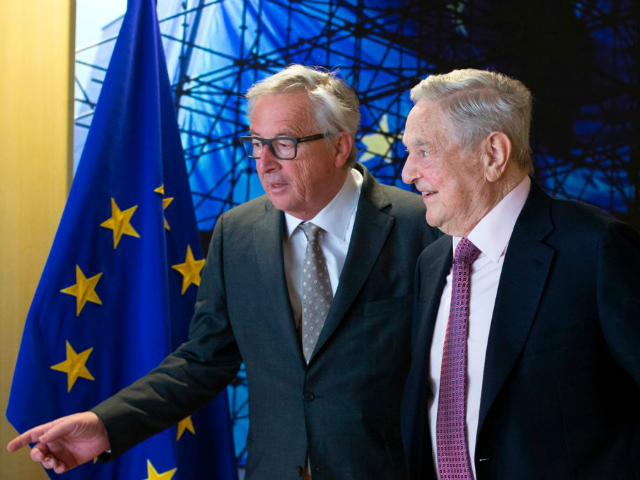
EU commission President Jean-Claude Juncker (L) welcomes George Soros, Founder and Chairman of the Open Society Foundations prior to a meeting in Brussels, on April 27, 2017
“I consider Xi Jinping’s China the worst threat to an open society,” Soros stated. Elsewhere in the article, the businessman deemed the PRC “a mortal enemy” of the West, which he said too often gave China the “benefit of the doubt.”
“We should recognize it: It’s a different system. It’s totally opposed to ours, diametrically opposed to ours,” he said of China’s ruling Communist Party.
“I’m not anti-Chinese at all. I’m just anti-Xi Jinping,” Soros added.
Top Biden Ambassador Picks Served on Board of China-Backed Group
Caroline Kennedy and Eric Garcetti are affiliated with Beijing-partnered Asia Society
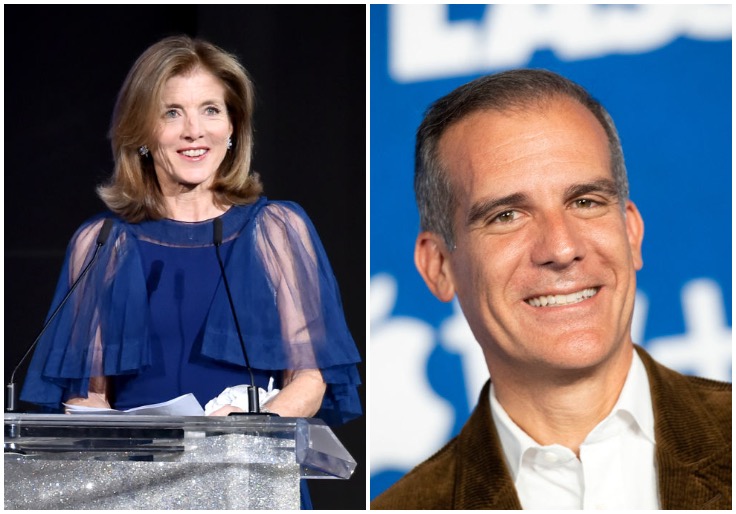
President Joe Biden's picks for two high-profile ambassadorships served on the board of a nonprofit group tied to Chinese propaganda organizations and several Chinese state-owned companies.
Caroline Kennedy, the daughter of former president John F. Kennedy and Biden's nominee for ambassador to Australia, served until October 2020 on the board of the Asia Society, which bills itself as the "leading force" for forging closer ties between Asia and the West. Los Angeles mayor Eric Garcetti (D.), whom Biden tapped for ambassador to India, is on the board of directors of the Asia Society's affiliate in southern California.
If confirmed, Kennedy and Garcetti will be at the epicenter of increased diplomatic tensions between the United States, its allies, and China. The Chinese government has ramped up military exercises in the Indo-Pacific and taken a more aggressive stance against India, Australia, and other countries in the region.
The Asia Society has faced accusations in the past that it caters to Beijing. In 2017, the Asia Society's Hong Kong Center came under fire for blocking pro-democracy activist Joshua Wong from speaking at an event. Rep. Chris Smith (R., N.J.) called the Asia Society's actions a "disgrace" and accused the organization of "kowtowing" to Beijing.
Founded in 1956, the Asia Society is a longtime partner of the Confucius Institute, a Chinese government-backed education program that disseminates propaganda to American students. The organization was an early supporter of the Belt and Road Initiative, a Chinese government infrastructure program in developing countries that the U.S. government considers a national security threat.
In 2015, the Asia Society organized a seminar through its Confucius Classrooms to promote the Belt and Road Initiative to high school students. In 2017, Asia Society president Kevin Rudd, the former prime minister of Australia, told Chinese state-controlled TV network CGTN that he supported Belt and Road.
Several of the companies that fund Asia Society are invested heavily in Belt and Road. They include the China Investment Corporation, the Industrial & Commercial Bank of China, China Merchants Bank, and the State Grid Corporation of China.
The Asia Society also has close ties to Tung Chee Hwa, the founder of the China-U.S. Exchange Foundation, which the Justice Department deems a foreign influence organization. Tung is a prominent figure in the Chinese Communist Party's united front, a network of organizations the party uses to advance its overseas interests.
Rudd hailed Tung as his "good friend" at a 2017 event to tout the Belt and Road Initiative. CIA director William Burns testified this year that when he served as president of the Carnegie Endowment for International Peace, he cut ties with the China-U.S. Exchange Foundation because of its influence activities.
The Asia Society's Hong Kong Center honored Tung at a virtual gala in November. Another honoree was Mochtar Riady, an Indonesian real estate tycoon who was one of the early funders of the Asia Society's Hong Kong branch.
Riady and his son James were implicated in a 1997 investigation of Beijing’s efforts to influence the Democratic National Committee and the Clinton White House. A 1998 Senate report said that Mochtar Riady was suspected of having links to Chinese intelligence. The Riady family vehemently denied the allegation at the time. The Asia Society named one of its facilities after Riady's company, Lippo Group, in 2017. Another son of Mochtar Riady, Stephen Riady, has served on the Asia Society's board since 2019.
Other Biden administration officials have faced scrutiny over their cozy connections to China's various front groups. Kurt Campbell, who oversees the Asia portfolio for the National Security Council, served until last year on the board of two organizations with deep ties to Chinese propaganda groups. Ed Gonzalez, Biden's nominee to lead Immigration and Customs Enforcement, partnered in 2014 with China's propaganda ministry. Linda Thomas-Greenfield, the ambassador to the United Nations, was paid by the Confucius Institute for a speech in 2019.
Indiana AG Investigates Valparaiso University’s China Ties
Todd Rokita slams 'negligent' administrators who let China influence students

Indiana's attorney general is cracking down on Valparaiso University for its ties to the Chinese Communist Party.
Attorney General Todd Rokita (R.) on Tuesday launched an investigation into Valparaiso University's chapter of the Confucius Institute, a Chinese Communist Party-backed organization that the State Department in 2020 deemed a national security threat. From 2011 to 2019, Valparaiso took more than $1.1 million from the Chinese Communist Party without specifying its uses.
Rokita told the Washington Free Beacon he launched the investigation after many of his constituents expressed concern about China's influence in Indiana.
"China unleashed a virus on the world, they continue to steal our intellectual property, they are human rights abusers, now they're calling us out on the international stage," he said. "It's in our state's interest to keep China accountable—this is one way to do that."
Schools have shuttered their Confucius Institute chapters in recent years as government officials and concerned faculty warned of Chinese espionage and challenges to academic freedom. Valparaiso's Confucius Institute is 1 of 41 Confucius Institute chapters still in operation as of July 2021, down from over 100 in 2017.
Valparaiso University did not return the Free Beacon‘s request for comment. In a statement to the Indianapolis Star, the university said it has been "transparent and compliant" when reporting funds from China.
"Valparaiso University does not and would not support any kind of endeavor that furthers or promotes communist ideology," the school said in a statement affirming its "Christian mission and purpose and … strong support of the First Amendment of the U.S. Constitution that protects the freedom of speech and religion."
But the Confucius Institute is not Valparaiso's only Chinese connection. The school runs an exchange program with Zhejiang University, a school with ties to the Chinese military. Zhejiang supports three Chinese military research labs, and American authorities have flagged the school for scientific and economic espionage.
According to the website of Valparaiso's Confucius Institute, the chapter also works with three Confucius Classrooms—the institute's K-12 arm—and six other outreach programs at local schools. The Free Beacon reported in July that China is using Confucius Classrooms and exchange programs to exert influence on American education.
Rokita slammed school administrators for their "negligent and insidious decision" to let China-backed groups influence Indiana students.
China is not the only country attempting to influence American schools. Under former president Trump, the Education Department investigated several American universities for failing to disclose $6.5 billion of gifts from countries including Qatar, Saudi Arabia, and the United Arab Emirates.
Obama’s Man in China Now Beijing’s Man in Washington
Former ambassador Baucus appears regularly on Chinese propaganda outlets
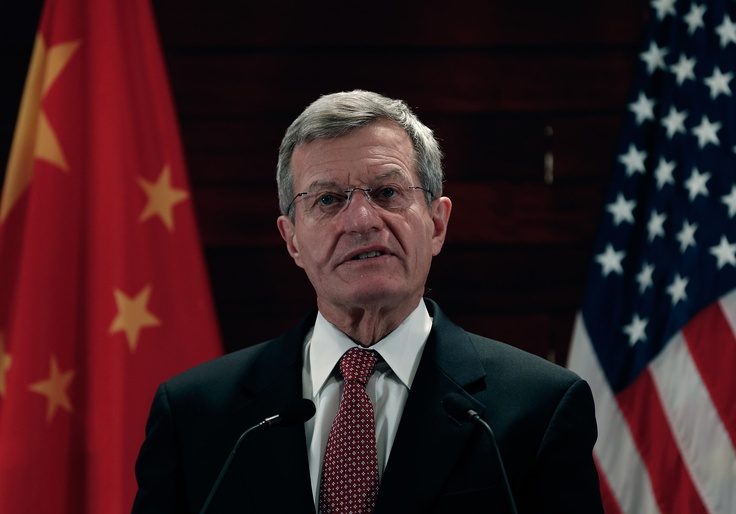
As the novel coronavirus wreaks havoc across the world, the Obama administration's ambassador to China has found a second lease on life as a pro-China talking head on regime propaganda outlets.
Former ambassador Max Baucus has given at least four different interviews to Chinese propaganda outlets in the last two weeks, repeatedly comparing the U.S. rhetoric about China to both the McCarthy era and Nazi Germany.
"Joe McCarthy [and] Adolf Hitler … rallied people up, making people believe things that were really not true," Baucus said during a May 12 interview with China Global Television Network (CGTN), a regime mouthpiece. "The White House and some in Congress are making statements against China that are so over the top and so hypercritical, they are based not on the fact, or if they are based on fact, sheer demagoguery, and that's what McCarthy did in the 1950s."
Since his retirement in 2017, Baucus has been a reliable critic of the Trump administration's increasingly confrontational China policy—chiefly the decision to wage a trade war with Beijing. He once warned that the White House's decision to impose additional tariffs was a "slap on the face" to China. But Baucus's recent comments in the pandemic era have been more sympathetic to China—and critical of the United States—than ever before.
His post-retirement public statements praising China have coincided with his burgeoning overseas investments. In 2017, he founded the Baucus Group, a consulting firm that advises both American and Chinese businesses, according to his U.S. Chamber of Commerce biography. He also sits on the board of directors for Ingram Micro, a U.S. subsidiary of a Chinese state-owned conglomerate, as well as the board of advisers for Alibaba Group, one of China's largest tech companies.
Walter Lohman, director of the Asian Studies Center at the Heritage Foundation, said that it was "inappropriate" for a former ambassador to speak ill about his own government on a foreign propaganda outlet.
"It's like going to China and … talking about your own government that way in meetings. I think that would be pretty inappropriate," Lohman said. "So it would be inappropriate speaking on state media."
Baucus's public statements have received considerable attention from Beijing's propaganda outlets. When the former ambassador compared President Donald Trump's criticism of China to rhetoric used by Adolf Hitler and Joe McCarthy during a May 6 interview with CNN, Chinese propaganda outlets quickly amplified Baucus's comments about how Trump was "a little bit like Hitler in the '30s" and that Americans were worried about "getting their heads chopped off" if they voice their disagreement with the U.S. government's China policy. Xinhua News Agency, a state-owned outlet, extensively cited Baucus's attacks in a May 8 article, using it as evidence that the Trump administration is attempting to "deflect criticisms about their blunders by blaming China." The article was syndicated in party-controlled mouthpieces such as Global Times and People's Daily, according to the Investigative Research Center.
Baucus then appeared on CGTN on May 12 to double down on his Hitler and McCarthy comparison, blaming the Trump administration for flaming "sheer demagoguery."
"[The current U.S. rhetoric] is somewhat reminiscent, nowhere close to that yet, somewhat reminiscent of the McCarthy era and somewhat reminiscent of Germany in the 1930s," he told CGTN.
The former ambassador also gave an exclusive interview to Global Times on May 14, where he said Secretary of State Mike Pompeo's claim that the virus may have originated in a Wuhan laboratory "makes no sense" and accused both Democrats and Republicans of being tough on China to score political points in an election year.
Baucus again appeared on CGTN on May 15, where he claimed that America is "sliding toward a form of McCarthyism" because the Trump administration is pressuring policymakers to be tough on China. The former ambassador did another CGTN media hit on May 16, this time appearing alongside his wife Melodee Hanes, who blamed the presidential election for making dialogue "difficult."
"There are a lot of pretty smart people in the United States who are not speaking up. People in office, moderates, especially moderates on the Republican side," Baucus said on May 15. "They are afraid to speak up, they are intimidated, intimidated by President Trump. And it's kind of sliding toward a form of McCarthyism—how it is politically incorrect to speak the truth, speak the truth to power."
When the Washington Free Beacon called the phone number listed for Baucus's home address, no one answered. A lawyer representing Baucus Group, the ambassador's consulting firm, also did not respond to a request for comment.
While Baucus rarely enjoyed this much attention from Chinese state media outlets after his retirement, this is not the first time he has spoken to Chinese media outlets in recent years. Baucus also gave an exclusive interview to People's Daily in March 2018, criticizing U.S. tariffs on Chinese goods as the "wrong policy" and "too confrontational." He has also spoken at events backed by the China-U.S. Exchange Foundation, a registered foreign agent of the Chinese government according to a 2018 congressional report.
Lohman, the Heritage Foundation expert, said that while Baucus has the right to appear on any domestic and foreign outlets, he should not have addressed a propaganda outlet with the same degree of candidness that he did with CNN.
"I think he must have gotten wrapped up in the media performances because when you shift from CNN to Global Times or CGTN, you've gone to an entirely new level," he said. "And there I think you just have to express yourself differently. It's not an appropriate place to air political differences."
Chinese regime reins in billionaire tech tycoons
Since November, the Chinese regime has taken several steps to restrict the operations of some of the country’s largest private tech companies, such as Alibaba and Tencent, hitting the fortunes of the multi-billionaire magnates that control them.
Last week, China’s State Council and the Chinese Communist Party’s (CCP) Central Committee issued a joint policy statement calling for legislation to codify the measures. It declared there was an “urgent need” for additional laws to regulate the digital economy and internet finance to ensure “new business models develop in a healthy manner.”
The measures have provoked growing concern in the Western press because of plunges in share values of tech companies, in which global managed funds and other foreign companies have heavily invested.
Bloomberg calculated that the combined share values of the giant tech corporations at the beginning of July had fallen by a massive $US823 billion since their February peaks. According to the Financial Times, since the start of July, Beijing’s “regulatory assault on China’s technology industry” had lopped $87 billion off the net worth of the sector’s wealthiest tycoons.
Moves against the tech giants began when the Chinese regulators cancelled what was set to be the worlds’ largest-ever Initial Public Offering (IPO), for Alibaba’s financial services subsidiary Ant Group on the Shanghai and Hong Kong stock exchanges in November. The IPO was about to raise $34 billion, eclipsing the $29.4 billion listing of the energy giant Saudi Aramco in 2019. At the same time, an anti-monopoly cause was launched against Alibaba that resulted in a $2.8 billion fine in April. Its founder Jack Ma, at the time China’s richest billionaire, who had made remarks critical of Chinese financial regulation, went to ground for weeks.
It has become clear this year that the government was not just engaged in a vendetta against Ma. The online food delivery company Meituan lost $40 billion of its market value after the state regulators opened an investigation into its “suspected monopolistic practices,” alleging that it was forcing restaurants to use its app exclusively, to the detriment of its rivals. Last month its shares plunged further after authorities instituted rules to provide limited protection to the notoriously exploited delivery workers.
The internet ride-hailing company Didi, China’s equivalent to Uber, proceeded with its IPO in New York in June despite a request by Chinese regulators to call it off. Days later, authorities ordered a security review of the firm amid concerns that the US listing could provide foreign access to its vast store of personal data. It was banned from taking new customers and mobile phone stores were ordered to remove its apps.
The regulatory targets have not been just tech companies. The Chinese government announced new regulations on July 23 for the online education industry, banning IPOs and forcing companies to operate as non-profit bodies. Shares in the three largest US-listed Chinese companies—TAL Education, New Oriental and Gaotu Techedu—fell precipitously.
In late July, Chinese anti-trust authorities ordered the giant internet corporation Tencent to give up its exclusive music licencing rights and fined it over its acquisition of China Music in 2016. The purchase gave Tencent exclusive control of more than 80 percent of music library resources, placing rivals at unfair advantage, according to regulators.
The response in the financial media has been increasingly frantic. An article this month in the New York Magazine declared: “The CCP’s brand of capitalism had never been Milton Friedman’s. But it had been decades since the party had displayed such communist characteristics.” An opinion piece by financial speculator George Soros in the Wall Street Journal last Friday denounced Chinese President Xi Jinping as a dictator whose regulatory campaign “threatens to destroy the geese that lay the golden eggs.”
Xi is not about to overturn Chinese capitalism, nor is the regime implementing “communist” measure. It is not out to destroy the super-wealthy oligarchs such as Jack Ma and Tencent’s Pony Ma, whom it helped to create, and with whom it has had close relations. Rather the regulatory efforts to rein in the sprawling tech empires reflect fears in ruling circles in Beijing about the country’s extreme social tensions and mounting economic and financial crisis.
These concerns found expression late last year when Xi announced that 2021 would mark the beginning of a “new development phase” that would prioritise “common prosperity,” national security and social stability over unrestrained growth.
Fears in Beijing over social stability stem from the widening gulf between rich and poor that has resulted from decades of capitalist restoration. At one extreme are the billionaires and multi-billionaires who in some cases are members of the CCP or have been delegates to the annual National People’s Congress. At the other extreme are large sections of working people struggling to survive. Last year, Premier Li Keqiang told a press conference that some 600 million people exist on a monthly income of just 1,000 yuan ($154), which is not enough to rent a home in a mid-sized city, let alone cover other expenses.
Social distress, which has been compounded by the measures necessary to control the COVID-19 pandemic, is among the factors fuelling a political radicalisation, particularly among young people.
In a comment last month hailing to mark the centenary of the CCP’s founding, Chinese academic and venture capitalist Eric Li noted that, unlike his generation that focussed on getting rich, China’s youth today are increasingly critical of capitalism.
Li wrote: “Significant signs show that Chinese young people’s perception of capital and market have turned negative, and their support for socialism and communism have increased markedly. For example, on Bilibili, China’s leading video social media for young people, content with communism, Marxism, capital, and labor became most popular in 2020, with increases greater than any other content. Even in the extraordinarily entrepreneurial tech sector, calls by young people for stopping excessive exploitations, both of lowly paid delivery workers and more highly compensated but overworked technical and professional workforces, are becoming louder.”
Li, who is an enthusiastic supporter of the CCP, maintained that the party was capable of responding to these concerns. No doubt, the targeting of high-profile billionaires is calculated to appeal to widespread hostility to widening social inequality, as are the moves to limit the gross exploitation of casual delivery workers. The transformation of the giant private education corporations into non-profit organisations is likely to be popular among parents concerned to ensure the best for their children in the highly competitive education system.
The CCP regime, however, is not reining in the thousand or so Chinese billionaires spawned by capitalist restoration across the board. Manufacturers have increased in value. The richest man in China is Zhong Shanshan, who controls the bottled-water company Nongfu Spring and whose wealth stands at more than $782 billion, up by $5 billion since June. The country’s nine richest auto magnates have increased their collective wealth by $22 billion since July, while the eight billionaires who dominate the renewable energy sector saw their collective riches rise by $13.6 billion during the same period.
Through their internet payment systems and provision of credit, the tech corporations, however, had become huge financial operations that function without the restraints maintained on the large state-owned banks. In 2020, Alibaba, Tencent and Ant had a combined market capitalisation of nearly $2 trillion, far greater that the state-owned banks such as the Industrial & Commercial Bank of China.
In his public criticisms last October at the Bund Summit in Shanghai, Jack Ma lashed out at the strong “pawnshop” mentality of Chinese banks that demanded collateral and guarantees before lending. He called for reform to create a new, inclusive and universal banking system for small businesses and individuals.
Through the various arms of Alibaba, Ma had created a massive financial empire and was effectively demanding a further removal of regulatory restraints. Alibaba established Alipay as an online payment platform in 2004. By 2018, it had an estimated 870 million users, accounted for about 60 percent of the third-party payment market in China and provided some $300 billion in credit for business and consumer loans. As well as Alipay, Alibaba’s Ant Financial Services provided micro-financial services at high interest rates through various operations such as Yu’ebao, Ant Credit Pay, Ant Cash Now and Sesame Credit, in some cases in league with provincial governments seeking ways to circumvent central financial controls.
Amid fears about the already high levels of debt and the potential for financial instability, the CCP apparatus took action against Alibaba and Ma. The moves were also driven by political concerns that Ma and other tech magnates were closely associated with foreign capital and could use their resources, including their vast accumulations of data, to undermine or challenge CCP rule. According a list published late last year by the Chinese financial magazine Caixin, overseas shareholders in Ant held 52 percent of shares, of which financial groups on Wall Street and in London accounted for half. In March, Ma was ordered to divest himself of various media outlets, such as the South China Morning Post.
The unregulated financial operations of the tech corporations also threatened to generate social instability. In an essay entitled “China’s Economic Reckoning—The Price of Failed Reforms” in Foreign Affairs, Daniel Rosen explained: “In the early 2010s, these firms were given a free hand by party technocrats who hoped that financial innovations would force ossified state-owned banks to become more productive. This succeeded, at least in fits and starts: the new firms made the financial system work for previously underserved customers.
“But innovation also came with new risks, such as peer-to-peer lending platforms that offered high rates to depositors and even higher rates to borrowers. When many of the borrowers defaulted, investors protested, believing erroneously that the platforms were guaranteed by the government. In August 2018, thousands of people showed up in the heart of Beijing’s financial district to demand compensation. A regulatory crackdown on peer-to-peer lenders commenced, in a prelude to this year’s scrutiny of Ant Group.”
The CCP’s attempt to rein in the free-wheeling operations of some of the country’s largest corporations is not a sign of strength. Rather, it points to the extent of the economic, social and political crisis building up in China that will erupt in the not-too-distant future.
No comments:
Post a Comment